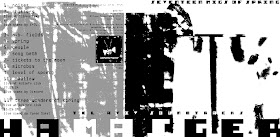Well, that was a close
call. After everything that was going on in Cairo,
I thought I better slip across the border into Israel as soon as possible. Then I find out I’d
been flagged on some Muslim Brotherhood watch-list because of my past as a magazine
editor/journalist, my Narco-anarchist Party affiliation, & some alleged
illegal operations I may have become associated with in the previous Century. I
called in a favor with a contact I still had with the Yamas (stemming from some
wet work I had done for the HaMossad leModi’in uleTafkidim Meyuḩadim during the
Brown/Goldman/Simpson thing). Now I’m sitting in a suite overlooking the
beach at the Dan Tel Aviv on the Israeli chit. Sweet. Here’s some really non-Middle Eastern music
to start off the Middle East. Just exercising
my middle finger before I get underway.
Seventeen Migs of Spring
was formed in 1999. Its members are Gurfa, K-67, & B-74. With names like
that, do you really think there’d be much information about these characters?
The album is Hamasger, which just adds to the obvious mystery they’ve
got going on here.
Their sinister
soundscapes are generated mostly in the physical domain, with spoken &
manipulated words & indistinct noise-making devices. The majority of the electronic
components of their sound are orchestrated by means of banks of inter-connected
equipment. When things get hectic the musicians become rather frantically
animated in a way that bloke-with-laptop acts never do. Their music leans
heavily towards cold, dark ambient trips, punctuated with digital glitchery
that has a decidedly industrial edge. The overall effect is a highly competent
& pleasingly hypnotic mixture of different, often conflicting cultural,
philosophical, & musical influences. It is hard to categorize or label.
Their sound is very different from release to release. Every live appearance is
unique & they are one of a kind, never to be repeated performances. Their
sound & style is always evolving.
This recording is from
their Hatzofe period. Tracks 1 & 2 were recorded live in Kolnoa Zamir on
June 12, 2004. “Chatters” features Synichkin on guitar (electro magnetic
interference sounds). Tracks 3 to 10 were recorded live in Hatzofe Club on
March 27, 2004. “Three Wonders of Spring” was recorded live during an ambient
break in Penetrating Crankshaft’s live set in Hatzofe Club on January 15, 2004.
It features Gurfa, Uliana Korentabak, & Sevil on amplified qwerty
keyboards.
Seventeen Migs of Spring- Hamasger, Tel Aviv Soundtracks, 2004.
decryption code in comments
Tracklist -
Noises
Chatters
A. B. Fields
Spring
People
Soog Beth
Tickets to the Moon
Microbes
Level of Speech
Swallow
Three Wonders of Spring
Eatliz first appeared in the Israeli indie scene in
September 2002. The group originally earned its following through word to mouth
& extensive touring of Tel Aviv clubs. Eatliz’s fans used to invite others
to come & see ‘the best band you haven’t heard yet’. That changed in
October 2007, when Eatliz released their full length debut Violently
Delicate on the Anova Music label.
Eatliz is the second musical project initiated by Guy
Ben-Shetrit, guitarist & main writer for the Israeli punk band Infectzia.
The songs Ben-Shetrit writes for Eatliz (butcher shop in Hebrew) are in
English. His complex compositions & arrangements move between various
musical styles in a way which seems nearly impossible. Different songs feature
influences of hard-rock, surf, punk, goth, & power-pop; sometimes all
within the course of a single song. The band usually describes its music as
“complicated pop” (it is probably more accurately modern prog).
Eatliz are: Lee Triffon – vocals; Guy Ben Shetrit, Or Bahir,
& Amit Erez – guitars; Hadar Green – bass; & Omri Hanegbi - drums.
Eatliz -Violently Delicate, Anova Music, 2007.
decryption code in comments
Tracklist -
Bolsheviks
Violently Delicate
Attractive
Hey
Sunshine
Say Where
Big Fish
I Don't Care
Mix Me
Be Invisible
Whore
Mountain Top
Big Fish
I Don't Care
Mix Me
Be Invisible
Whore
Mountain Top
Enjoy,
NØ








































